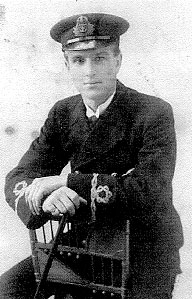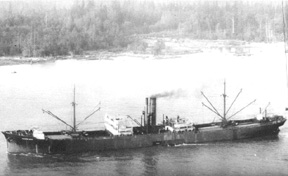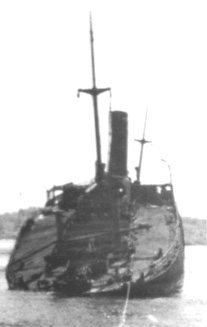|
|||||||||
| Research Document #20 | |||||||||
| The
Report of the Board of Trade’s Inquiry into the Wreck of the Norwich City |
|||||||||
| This document is provided on this web site as a matter of general interest and to aid in research by individuals. No permission to reproduce it or transmit it is implied or granted. | |||||||||
Click
on any link below to go to that document.
|
|||||||||
The vessel stranded on Gardner Island, Phoenix Group, shortly after 11 p.m. 29th November 1929. I was on the bridge when the vessel struck what turned out to be the reef of a coral island, but one can well imagine the momentary consternation of those who were in their bunks on receiving orders to don lifejackets and prepare lifeboats. On deck nothing could be seen, the darkness was intense and it was raining heavily. Strong westerly wind and high seas were striking the ship and she was pounding heavily on the reef so that men coming along the deck were thrown in all directions. Lifeboats were provisioned and got ready for launching while the officers and myself sounded around the vessel to ascertain her exact position. Having concluded that it was hopeless to attempt letting her off during the night, I decided to wait for daylight. Everyone by this time was reassured as to immediate danger but there was still the possibility of the ship breaking in two. All hands were ordered to remain aft the funnel in order to be handy for the lifeboats should this happen. Shortly after 4 a.m. smoke was seen issuing from the engine room and in less time than it takes to tell the engine room, stokeholds and number three hold burst into flames. Fanned by the strong wind it wasn’t long before the vessel presented an alarming spectacle. Minor explosions were occurring at frequent intervals while the crew were engaged getting out lifeboats and lowering them to the rail. As dawn was not far off it was hoped that we could remain until then, but the situation developed too quickly and she was left about 5.15 a.m. My part in the proceedings ended about 4.30 a.m. After seeing the starboard lifeboat safely lowered to the rail, the Chief Officer and I crossed over to attend to the port boat. This being the weather and outside boat, was only to be used in case of necessity. The boat was swung out and before lowering I heard water running over the side. Not wanting the boat filled I approached the side to ascertain the cause when the vessel was struck by a heavy sea and shaken violently. The Chief Officer luckily was thrown inboard but I hit the water some 40 ft below, just missing a grip on the boat deck in passing. I was swept out clear of the ship about 50 yards by the backwash from the seas. I called out for someone to lower a rope over the side. They heard me twice and then lost sight of me and gave me up for lost. I was trying to swim back to the ship but was being taken by the current past the bow and was at one time about 150 yards from where I fell and about 50 yards from the surf.
Looking back over the event I am glad I did not reach the rope hanging over the side of the ship. I should have been smashed against the ship’s side with the next sea that came along. Maybe if I had given a thought to sharks, things may not have turned out so happily for me; as it was I was very thankful to be ashore. The most regrettable incident was to follow. When the lifeboat with all hands was leaving the ship it was drawn up into the tremendous surf and capsized throwing most of the crew into the sea, eleven of them losing their lives. Four were imprisoned under the boat, one of them was found drowned when the bottom was cut out of the boat. The other three had managed to keep their heads above until help came.Most of the survivors in their efforts to reach safety had discarded as much of their clothing as possible, some were without boots, some without clothes and most of them were cut about the body by the sharp coral and rocks. All were in a very dejected state but thankful to have reached safety. The steward, poor chap, was the most unfortunate of all. He had practically reached safety when he collapsed and was drowned before anyone could give him assistance. He was brought up on the beach, artificial respiration was tried for about an hour without avail, and we were all reluctant to give up. He was a very popular fellow and everyone expressed their sympathy for his relatives in their sad bereavement. Later we all paid him our last respects, gave him a Christian burial and placed a cross of coral at his head. Both lifeboats and most of the equipment were washed ashore so all who were able gathered these together and placed them well clear of the tide. This done we all sought the shelter of the trees and laid down to rest. The beach was very exposed so a camp site was selected some 100 yards into the woods, all hands assisting in carrying provisions etc. Fortunately all those who reached safety were uninjured so we were unhampered in that respect. The boats’ sails were used to make a tent to keep out the rain but when they became saturated rain began to come through making life fairly miserable. The second mate and several others now went exploring the island. They returned some time later having found a small lake of fresh water. The three firemen returned with some cocoanuts . More than half of the survivors were without boots so had to remain in camp. About noon on Saturday the first ration was issued, which consisted of one biscuit covered with corned beef and half a tin of milk and water. A similar issue was given to each man about sunset. During the afternoon, after several attempts a fire was made which cheered us considerable enabling us to dry our clothes. The rain had ceased but several showers occurred during the night. Short of seeing our homes, the next dawn was the most cheerful sight on earth. The night seemed endless with no means of knowing the time, the sky being overcast. Trying to sleep on the hardest of soft planks is bad enough, but it's a feather bed compared to coral. In addition to this discomfort huge land crabs and rats were entering the camp. Those on the outside got very little sleep, in fact one was only too pleased to remain awake keeping the fire burning. People at home and in Australia go camping for pleasure, but rest assured the survivors of the Norwich City have had all the camping they require for the rest of their lives. The dawn came with the promise of fine weather and shortly afterwards each man was given a dipper of water and the camp was reorganised. A more suitable site was selected and parties told off for various jobs. One party under the Second Officer was told off to obtain water, another for cocoanuts and the remainder to build a shelter. The lifeboat axes came in very useful for this. Small trees were cut down, trimmed and lashed between four large trees in the form of a square. A trellis of smaller trees and branches was formed on top and over this the two sails were spread. Around three sides a barricade was made to keep out the crabs, leaving the lee side open for the fire, which was soon got under way. The ground was cleared of twigs etc., and then covered with leaves over which was placed a couple of blankets and old canvas which had been washed ashore. Altogether it looked and was fairly comfortable. The waterparty had returned by this time and we all had an issue. It didn’t taste good to me so all water from that source was boiled before use, there being sufficient water in hand to use while the other was cooling. Later the other party returned with several cocoanuts, so we decided to have lunch. Biscuits, one in number covered with meat, and half a tin of milk. We used twelve tins of water to two of milk; for dessert we had cocoanut. This was about 11 a.m. The next sumptuous repast was taken at sunset and everyone settled down for the night. This back to nature business didn’t suit some of us at all, the night being too long and we had too much to think about; others, I think would have slept pegged out on a clothes line. Monday dawned after another endless night and when it became light enough we all made for the beach, hoping we should see a ship coming to our assistance, but nothing was in sight. After attending to our toilet we returned to camp and each received one dipper of water. The water supply at the lake was found to be evaporating rapidly in the heat of the sun so as much as possible was obtained and stored in a couple of tanks taken from the lifeboats. Our water supply I daresay would have lasted about three weeks at the present rate, longer if necessary. We were all confident that we would receive help before our supplies ran out. Our operator was at his post almost immediately we struck the reef and it was three hours before he got through to Apia and we were lucky to get an answer at all as the noise from static was terrific. He remained at his post until the end sending out the final message that the vessel was on fire before leaving and taking up his boat station, so we expected to see some ship that afternoon or next day. You may depend some of us were always on the beach that day. The first day we anxiously awaited King Sol, but now we were getting a little more than we wanted of him and with the scanty clothing some had on, they were getting very sunburnt and the heat was extremely painful. After attending to the requirements of squaring up the camp, the rest of the day was passed in roaming at will, although those with boots were the only ones able to exercise. The island seemed to be an extinct volcano, the crater being filled with salt water each high tide from two very shallow inlets. I daresay the area would be about three square miles, the centre fathoms deep and some of the prettiest shades of green imaginable, but like most good things had its drawbacks. Sharks! Not large ones but about 2 ft in length and without exaggeration hundreds. However, one would be sufficient to quench any desire I had for bathing. In the sunlight the lagoon looked magnificent. Situated as we were we had time to admire it.
Monday night, the last night we fondly hoped to be on the Island passed at last. Just before the dawn the mate was awakened by the playful nip from a big crab. He was the handiest to the barrier and he nearly jumped out of his clothes. This awoke most of us and we were contented from then on to wait for the dawn. As soon as it was light enough we had a dipper of water and all made tracks for the beach, confident that a ship would be in sight. Imagine our disappointment on seeing an empty sea. It was a very quiet party that returned to camp about an hour later to receive their milk and biscuit. Afterwards several parties set out for the other side of the Island and on their way sighted two steamers coming round to our side. It wasn’t very long before those in camp knew the good news and all were on the beach in no time, sore feet and coral forgotten. To see those two vessels approaching, one from the north and the other from the south was the finest sight I have ever seen. Our excitement died down after a while, our thoughts having turned to those buried on the beach. All expressed their profound regret at having to leave them behind and tendered their sincere sympathy for those they have at home. Such is a Sailor’s life! The vessels were the S.S. Trongate of London and the M.V. Lincoln Ellsworth of Oslo. The Trongate had been sent to our rescue by Administrator Allen of Apia; the Lincoln Ellsworth was bound from San Francisco to Sydney, loaded with bensoine. Both had slowed down during the night and made the Island by daylight arriving on the east side, meeting then turning round and arriving at the scene of the wreck about the same time; this would be about 8 a.m. The Lincoln Ellsworth was seen lowering her motor boat, the Trongate lowering a boat from her after deck, which when manned made for the breakers. We on shore knowing the danger tried to warn them not to try landing there but to seek a more favourable place. The boat was handled with superb skill, coming through the surf about 200 yards south of the wreck. They landed on the shelf which extended about 200 yards from the beach, there being about 3 ft of water on it at high tide, and must be sheer cliff, there being 60 fathoms of water within 20 yards of the breakers. Several of us went out to meet the boat in which was a crew of six Ellice Island natives whom Administrator Allen, with wonderful foresight had recruited and sent to our assistance. These men were of splendid physique and the way they handled their small surf boat through the surf was worth seeing and gave us hope that we should all get safely off the Island. We assisted in getting the boat to the beach, took the water and provisions which Capt. Swindell of the Trongate had thoughtfully provided and made for camp, where I assure you they were made full use of. The Natives chief concern was whether there were any crabs on the Island. They were highly delighted when we told them how big and numerous they were. In fact they didn’t wait to hear anymore but set out right away in search of them. It appears that those crabs are a delicacy in Apia. It would have taken some coaxing for me to dine off one. The two vessels now cruised along the reef in search of a suitable place, the surf near the wreck being far too dangerous. A place was found about 1 1/2 miles south of the wreck, the breakers being not quite so bad, but bad enough to make it anything but a joy ride to get over. Before leaving camp all provisions etc., were placed in the shelter, but I sincerely hope that no-one will ever be so unfortunate as to need them. We then crossed the lagoon in the boat to where the vessels were waiting on the outside and transported the boat to edge of the reef. It was now about 2 p.m. I was not too optimistic as the breakers were increasing in size owing to the rising tide. However, it was decided to make an attempt.
| |||||||||
THE RESCUE
| |||||||||
|
About 2 p.m. the first attempt was made. Three men were told off to get into the boat. This meant that eight trips would have to be made with only about four hours to do it in. It appeared to me that some of us would have another night on the Island and as camp could only be reached with the boat the prospects of a night on the reef without shelter wasn’t very pleasant. However, we hoped for the best. Several unsuccessful attempts were made. How the coxswain kept the boat’s head to sea is a mystery to me. He would give the order to launch, all hands assisting as far as possible, then the crew would leap on board and row frantically, the coxswain taking the steering oar, standing upright in the stern as if glued there. Three times they were driven back, the boat standing on end so that one could see the whole of the inside of the boat, and the boat being half filled with water. Each time it came down the coxswain was standing there as if the boat were on a lake. As the boat reached the reef he would leap out, hold her head to sea until others came to his assistance. The first three had had enough by this time and I didn’t blame them any for getting out of the boat. I had seen enough and I didn’t feel disposed to tell off any others; I told them that if any wished to go that night they could do so. There wasn’t any rush! The danger was not so much from the surf but from the numerous sharks that had collected. Should the boat turn over there would be precious little hope of being saved. Had it not been for these sharks we could have been hauled through the surf to the waiting boats. I did not think the natives would make any further attempts that night but about half an hour later they decided to try again and three adventurous spirits, the Second Engineer, Wireless Operator and Cabin Boy got in and were across the surf in no time. Great excitement prevailed, the Trongate and Lincoln Ellsworth blowing their whistles and everyone cheering. The surf boat was then taken in tow by the motor life boat to the Trongate. The surf boat returned shortly afterwards with only half the crew. They had decided that with our assistance to get to the edge of the surf, the boat would be easier to manage with three men. After several more unsuccessful attempts, it was suggested that they should go out alone, row along the edge of the surf to the southward, where possibly there would be a more suitable place, to which they agreed. About an hour before sunset they tried again with one sailor, but this time the boat was turned over and completely swamped, the sailor being hauled to safety by the crew. The natives decided to remain ashore and we were very thankful to have them as events proved. We all turned to now and hauled the boat to the beach. The natives set off in search of cocoanuts with several of us in their wake, hoping we should find plenty of green ones, so that we could have a drink. About half a dozen were obtained but as there were about eight in the company, the drinking didn’t amount to much. The tramp back to the beach seemed endless, two were asleep as soon as they hit the sand. The natives, however, were just beginning to get warmed up; they came back with what they considered a sumptuous meal, a few crabs as big as a plate and a sea bird or two, well pleased with themselves – in fact they were enjoying the outing. A fire was wanted, but how? Our few matches were wet and the sun had set. This is where the natives proved invaluable. A little matter of no matches, flint or steel didn’t worry them in the least. In less that half an hour we had a roaring fire, the natives making it by rubbing two pieces of dry stick together and setting fire to some fibre and dead cocoanut leaves. We made beds of leaves and settled down for the night. Next day dawned, everyone hoping that it would be the last day they would have to spend on the Island, all eager to get busy and willing to barter the Island for a spoonful of water. It was useless to make any attempts to leave the Island before high water, for which we impatiently waited and about 8 a.m. the boat was hauled out to the edge of the surf. The swell outside the surf was much less than on the day before but the natives were not very optimistic. However, three men were successfully taken off shortly afterwards. I sent a message with them to Capt. Swindell asking him for water, biscuits and tobacco in case some were stranded for another night. I must say that he was very liberal with the rations, sending enough for month. About noon the boat returned with stores which were taken to the beach. Each man had a tin of water and some biscuits. Water never tasted so sweet. All attempts were successful in the afternoon. Three men went first time and then three fours and finally three. Had it not been for the motor boat of the Lincoln Ellsworth, I doubt if we would all have got off that day. As the surf boat got beyond the surf, the survivors were transferred to the waiting boat from the Trongate which was then taken in tow to the Trongate by the motor boat thereby saving valuable time. There was no waiting and in less than ten minutes the surf boat was back again ready for another attempt. No thought of sharks now, all we thought of was getting off. As the numbers on the shore were getting less, the work of launching the boat was getting harder. Finally there remained but three, the Second Officer, Senior Apprentice and myself and we decided to rest awhile, then if possible to take what we could of the stores etc., off with us. The natives gave us a hand to get them to the boat; we were now ready to be off. It was a case of all hands outside the boat now. He waited for the coxswain to give the word, then launched and jumped. We were well over, landing in the bottom of the boat on all fours and within ten seconds were safely clear of the Island. Only about twenty yards of dangerous water existed at any time but I am convinced that only experts such as were sent to our rescue could have been successful in crossing it. All were on board the good ship Trongate at 2.15 p.m. no one more thankful than I to be alive. We all had a wonderful reception when we got on board Capt. Swindell doing his utmost to make us comfortable. It was arranged that twelve should go to Apia with the Trongate and twelve to Sydney with the Lincoln Ellsworth. We who were going on the Lincoln Ellsworth bid goodbye to those on the Trongate hoping to meet again under more pleasant circumstances. Just before 3 p.m. all for Sydney boarded to Lincoln Ellsworth and were met by Capt. Tichendorf who at one made us feel at home and arranged everything for our comfort. The survivors of the ill-fated Norwich City will be eternally grateful to those who assisted in their rescue from most trying conditions, particularly to the surf boat crew, Administrator Allen of Apia, Capt. Swindell of the S.S. Trongate and Capt. Tichendorf of the MVLincoln Ellsworth. They all join me in saying “For they are jolly good fellows.” Our passage to Sydney was all that could be desired, everyone, Master, Officers and crew doing their utmost to make us comfortable.
|
|||||||||
|
Click on any link below to go to that document.
|
|
|
|
||||||||||
|




